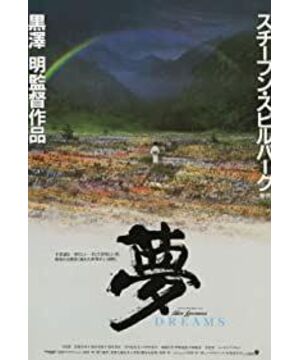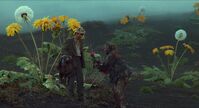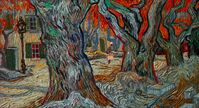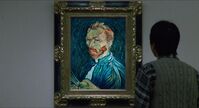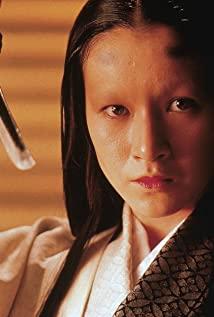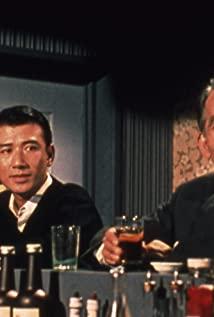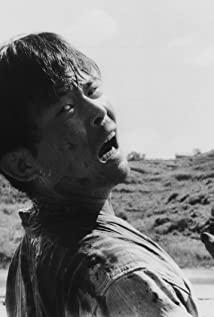Especially the "residues" of waking thoughts and actions can stir up restlessness in the soul. --Cicero, "On Prophecy"
Experience, habit, desire, thinking, these things that often fall into a dream, rely on the huge weaving ability of the unconscious to weave one dream after another. Dreams may be the entanglement of "Mulholland Drive" style, or the seriousness and absurdity of "Scientific Sleep" style, or the strange and bizarre style of "Red Pepper". The diversity of forms constitutes the diversity of dream expression. Akira Kurosawa's "Dream" is different from the conventional "deformation" expression of dreams in movies, but weaves a fable in a more straightforward way. the "dream".
"Dream" consists of 8 dream fragments: Dream of Fox and Sun Rain, Dream of Taoyuan, Dream of Snowstorm, Dream of Soldier, Dream of Van Gogh, Dream of Red Mount Fuji, Dream of Ogre, Dream of Waterwheel Dream.
These dreams deconstruct Kurosawa Akira's thoughts in his later years-thinking about life, society, and the world with brilliant colors.
1 Remembrance
If the mental processes from the unconscious in the waking state are "forward", then we can say that the dream is "regressive". - Freud
The fox, the dream of the sun and rain, the dream of Taoyuan, and the dream of Van Gogh together form a chapter of "reminiscence".
"The Dream of the Fox and the Sun and Rain" tells the story of a curious child who peeks at the fox's wedding on a rainy day, breaks the taboo, and is punished by the fox. "Dream of Taoyuan" tells the accusation of the dolls on the girl's festival against the felling of peach trees by humans. Children, as a conscientious "spectator", witness their disappearance under the dance of the dolls.
These two dreams together form the retrospect of childhood. The colors are gorgeous, and the fantasy paintings of childhood are drawn with anthropomorphic techniques and gorgeous colors. Although they focus on taboos, punishments, destruction, etc., they are still full of beautiful expectations—— The child saw a beautiful rainbow on the way to find the fox to be punished; new peach branches appeared in the felled Taoyuan.
"Van Gogh's Dream" is closely related to ideals. Through the dialogue between the youth and Van Gogh, while paying tribute to the master, he indirectly expressed his views on creation, ideals, and even nature-creation is a gift from nature. Among them, imaginative expressions such as the "restore" of the oil painting scene and being in the paint make this dream look wonderful and vivid.
2 thinking
The Dream of the Snowstorm and the Dream of the Soldier are the main body of this chapter.
"Blizzard Dream" is a story about people overcoming adversity and "death". Akira Kurosawa used anthropomorphic means to represent the "temptation of death" when she was buried in the wind and snow as beautiful women, bringing a warm illusion to people and calling for the coming of death.
The roar of thunder puts us on the battlefield; the crowing of a rooster causes one to scream in fear; the creaking of a door causes a dream of a thief.
Through a roaring dog, "Soldier's Dream" brings the lonely commander back to the hallucinations of dead soldiers, allowing people to face the pain, loss and guilt in their hearts, and accuse the devastation of war on people.
3 Fables
Dreams express "what if" by placing the relevant person in a certain situation.
The Dream of Red Fuji and the Dream of the Ogre are all about placing characters in specific situations to express "what if".
What if there is a nuclear explosion? "The Dream of Red Fuji" has made fables - panic, fleeing, people jumping into the sea to commit suicide, repenting scientists, and children with no future. Mount Fuji, which was affected by the explosion, was reflected in bright red, and the beautiful smoke of red, yellow, and purple conveyed the name card of the god of death with the help of the wind.
What if humans continue to destroy nature? Humans turned into ogres, punished by their sins, "they only wanted to die, but they couldn't, no one would kill them, they could only scream . " The "Ogre Dream" is such a tragic dream.
These two dreams unabashedly accuse human beings of destroying nature, and in the form of horror fables, announce the cocooning of human beings. These two passages are often criticized as "straightforward edification" due to their overly explicit lines. However, this kind of "good advice" may reflect Kurosawa's urgent concern for environmental issues. These straightforward warnings not only convey criticism, but also remind the world not to forget "reflection".
4 Hope
The content of the dream is the fulfillment of the wish, and the motive of the dream is the wish. - Freud
"Dream of a Waterwheel" was Akira Kurosawa's last dream. A rosy vision of the future, an over-expected wish, is hopelessly presented in a dream.
"They may be smarter than others, but most of them don't understand the true meaning of nature. " Through the mouth of the old man, Akira Kurosawa pointed out his concern for nature at the end, which contains deep yearning for beautiful and clean nature.
"A happy funeral" is also his expectation. When he was alive, he worked hard; when he died, he was grateful to his relatives, friends and villagers. His love and obedience to nature is also reflected in his relieved attitude that "when you get older, you will die naturally".
Of course, Akira Kurosawa's wish is about the future of mankind as a whole, and his concern for mankind is reflected in his concern for nature and the environment, because nature restricts everything in human civilization. Human beings are often complacent in the rapid development, and gradually forget nature, and forget that nature controls the survival of human beings. Therefore, Akira Kurosawa wakes up the world with "Dream".
5 Summary
"It's just a dream", this sentence is an afterthought to appease the effect of mental censorship.
Akira Kurosawa's "Dream" is never just a "dream", they are the future dressed in reality and cautionary fables. When we only regard "Dream" as a curious and turbulent "dream", we take everything into consideration. When Vigilant appeals to "this is just a dream", we only hope that our descendants, when facing this broken world, can regard the cocooning of human beings as a dream.
Schopenhauer said: "Dreams are short-lived madness, and madness is a long-term dream." Can Akira Kurosawa's two-hour crazy "dream" wake up the crazy world that has been dreaming all the time?
View more about Dreams reviews


